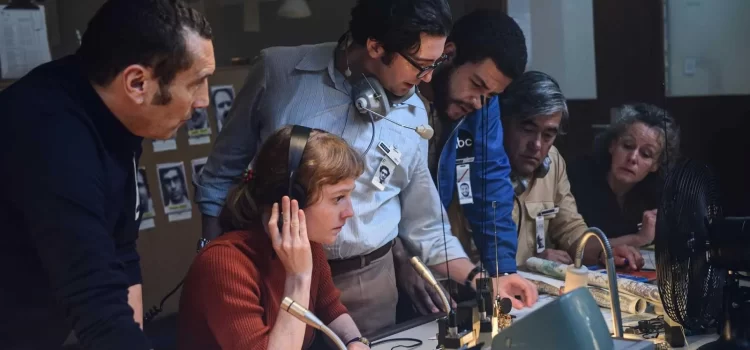By Lynn Venhaus
“They’re all gone.”
ABC Broadcaster Jim McKay looked into the camera and gave us the horrifying news live from the 1972 Munich Olympics.
The tragic outcome was a gut-punch, for the news a short time earlier had been hopeful. That sickening feeling is authentically duplicated in “September 5,” an intense and riveting film that has meticulously recreated the network’s control room perspective.
As gunfire rang out in the Olympic Village early morning, the ABC Sports crew was thrust into action covering the breaking news as the world’s eyes and ears.
As TV executive Roone Arledge, Peter Sarsgaard leads an exceptional workmanlike ensemble, including John Magaro as producer Geoff Mason, Ben Chaplin as Marv Bader, vice president of ABC Olympics operations, and Leonie Benesch as Marianne Gebhardt, a German translator who is called on to play a bigger role.
Eight members of the Black September militant group scaled a fence, broke into Israeli athletes’ quarters, killed wrestling coach Moshe Weinberg and weightlifter Yossef Romano, and then took nine hostages.

Black September, an affiliate of the Palestine Liberation Organization, demanded the release of 236 prisoners: 234 in Israel and the two leaders of the West German Baader-Meinhof terrorist group.
No one anticipated such an event, nor had anything like this ever happened previously. It was the 10th day of competition, the first Olympics hosted in Germany since the controversial 1936 Berlin games presided over by Adolf Hitler.
The hostage mission failed. About 20 hours after it began, five of the hostage-takers would be dead, along with 11 members of Israel’s Olympic team and a West German policeman.
In retrospect, it is a moment that forever changed media coverage, an impact felt today. It was the first time an act of terror was live on television. Chilling images from that period still burn bright – especially the terrorist in a ski-mask on the balcony.
With its ‘you are there’ point of view, the tension is palpable in this 95-minute masterly constructed film as news and directions shift. Decisions are made in split-second time, and the staff is trying to be responsible while the clock is ticking, rumors swirl, and 900 million people are glued to television screens.
These are sports guys, not experienced journalists, and you see them adapt, with the added concerns of not sensationalizing an already fraught situation and just trying to maintain coverage just staying on the air.

Swiss director Tim Fehlbaum and his crew have seamlessly blended archival footage with the routines of a darkened media center using analog equipment. At the time, the technology was state-of-the-art, and you see how resourceful they are with the now-primitive pieces.
Technology aside, the questions facing this operation are the same journalists wrestle with today, and that is what makes this tale so fascinating. Fehlbaum co-wrote the tight script with Moritz Binder, and co-writer Alex David.
The Munich Olympics have been the focus of two previous films, Steven Spielberg’s 2005 historical drama “Munich” and the 1999 Oscar-winning documentary “One Day in September.”
And this one avoids making a political statement, preferring to focus on media, not the politics of Israeli-Palestinian relations. The film was in post-production when Hamas attacked Israel in October 2023.
The control room offers a fresh perspective, and adds to the claustrophobic nature of the story, as well as the balancing act of a group of different individuals needing to set aside their personal views.

Noteworthy are Benjamin Walker as Peter Jennings, the reporter on scene, and Zinedine Soualem as French engineer named Jacques. Jim McKay is only seen in archival footage.
Production designer Julian R. Wagner’s handiwork accented the crowded space, shooting at the Olympic village, which is now a heritage site, also added to the realistic atmosphere, and the taut editing by Hansjörg Weißrich kept the story on track.
Overshadowed by the massacre, the XX Olympiad was also known for Mark Spitz earning seven gold medals for USA, a world record until 2008, and Russian gymnast Olga Korbut became a media star as she won three. Competition had stopped for 34 hours, then resumed.
Winner of the audience award at the St. Louis International Film Festival in November, “September 5” is worth seeking out for its smart, insightful capture of a significant moment in time. It’s obvious that the splendid cast was committed to ‘getting it right,’ and they convey all the dedication, compassion, confusion and drive of the people involved.
“September 5” is a 2024 historical drama directed by Tim Fehlbaum and starring Peter Sarsgaard, John Magaro, Ben Chaplin, and Leonie Benisch. It is rated R for language, and the runtime is 95 minutes. It is opening in St. Louis theaters Jan. 24. Lynn’s Grade: A

Lynn (Zipfel) Venhaus has had a continuous byline in St. Louis metro region publications since 1978. She writes features and news for Belleville News-Democrat and contributes to St. Louis magazine and other publications.
She is a Rotten Tomatoes-approved film critic, currently reviews films for Webster-Kirkwood Times and KTRS Radio, covers entertainment for PopLifeSTL.com and co-hosts podcast PopLifeSTL.com…Presents.
She is a member of Critics Choice Association, where she serves on the women’s and marketing committees; Alliance of Women Film Journalists; and on the board of the St. Louis Film Critics Association. She is a founding and board member of the St. Louis Theater Circle.
She is retired from teaching journalism/media as an adjunct college instructor.

